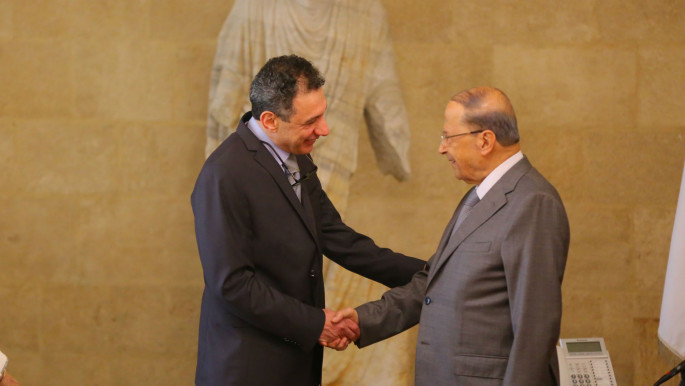Internet freedom campaigner Nizar Zakka lands in Lebanon after Iran jailing
A US permanent resident and Lebanese businessman who was released in Iran following years of imprisonment arrived in his native Lebanon on Tuesday.
Nizar Zakka, held in Iran since 2015 on charges of spying, arrived on a private plane accompanied by the chief of Lebanon's General Security chief Maj. Gen. Ibrahim Abbas, who had travelled to the Iranian capital to bring him home, an airport official said.
He arrived at the presidential palace later Tuesday. Zakka flashed reporters the victory sign and hugged his brother Ziad before he went into a meeting with President Michel Aoun, who had personally requested his release.
Zakka is one of several prisoners with either dual nationality or links to the West held in Iran. Lebanese officials have for years asked for his release, and it was not clear why Iran decided to act now.
Earlier on Tuesday, an Iranian judiciary official confirmed that Tehran has agreed to hand over Zakka to Lebanese officials, providing the first official confirmation of his release, which had been anticipated for days.
"A court has accepted the condition of freedom of Nizar Zakka and he will be handed over to Lebanese officials," judiciary spokesman Gholamhossein Esmaili said, according to the judiciary's Mizan news agency.
A report Monday on the Iranian state TV's website mirrored an earlier one carried by the semi-official Fars news agency about Zakka, an internet freedom advocate who was arrested in September 2015 while trying to fly out of Tehran.
He had just attended a conference there on the invitation of one of the country's vice presidents.
State TV, like Fars, quoted an anonymous source saying Zakka's forthcoming release should only be seen as a "sign of respect" for the Lebanese militant Hizballah group and its leader, Hassan Nasrallah.
"In this regard, no negotiations have taken place at any level with any person or any government," state TV said.
Esmaili stressed that Zakka's release was within "the frame of the law."
 |
|
|
Zakka met with President Michel Aoun, who had personally requested his release. [The New Arab/Hussein Baydoun] |
"We reviewed the (Lebanese) president's request through the Supreme National Security Council," Esmaili said. "Also, the Lebanese Hizballah group considered the approval of his freedom as prudent."
The leader of the Iranian-backed Hizballah has not made public comments about Zakka's imprisonment, but pro-Hizballah media have said that Nasrallah had in recent days urged the Iranians to facilitate his release.
State TV later quoted an anonymous source as saying Zakka would be released on Tuesday afternoon and will be allowed to leave Tehran.
In 2016, Iran sentenced Zakka to ten years in prison. Authorities accused him of being an American spy, allegations vigorously rejected by his family and associates.
Zakka, who lives in Washington and holds resident status in the US, leads the Arab ICT Organization, or IJMA3, an industry consortium from 13 countries that advocates for information technology in the region.
The White House said it is "thankful" for Zakka's release from Iranian custody, but wants to see other Americans who are detained there released as well.
"The big question is there's several others and we want to see those people released as well," said Press Secretary Sarah Sanders. She declined to say whether the US government was involved in securing Zakka's release.
In 2016, The Associated Press reported that Zakka's supporters wrote to then-Secretary of State John Kerry, stating Zakka travelled to Iran "with the knowledge and approval of the US State Department, and his trip was funded by grants" from it.
Zakka's IJMA3 organisation had received at least $730,000 in contracts and grants since 2009 from both the State Department and USAID, the lead American government agency fighting poverty and promoting democracy across the world.
The State Department has yet to respond to a years-old request from the AP for information about those grants.
Shahindokht Molaverdi, an adviser to President Hassan Rouhani who as a vice president invited Zakka to Iran, told the AP in September that Iran's government had "failed" to help Zakka.
"This is in no way approved by the government," Molaverdi said. "We did all we could to stop this from happening, but we are seeing that we have failed to make a significant impact."
Agencies contributed to this report.





 Follow the Middle East's top stories in English at The New Arab on Google News
Follow the Middle East's top stories in English at The New Arab on Google News


